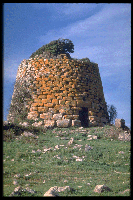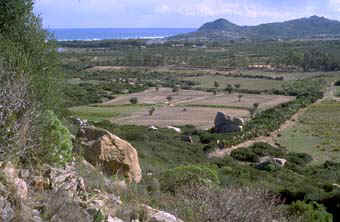
| |
Sardinian - Sardu - is currently spoken by more
than 1.5 million people, but it has many dialect differences. There is virtually no
literature, not even a newspaper, in the language (although satirical journals do appear
from time to time). In earlier times the language was probably spoken in Corsica, where a
Tuscan dialect of Italian is now used (although French has been  Corsica's official
language for two centuries). From the 14th to the 17th century, Catalan (at that time the
official language of Aragon, which ruled Sardinia) was used extensively, especially for
official purposes; a Catalan dialect is still spoken in Alghero. Castilian began to be
used in Sardinian official documents in 1600 but did not supplant Catalan in the south of
the island until later in the 17th century. Since the early 18th century Sardinia's
destiny has been linked with that of the Italian mainland, and Italian is now the official
language. Corsica's official
language for two centuries). From the 14th to the 17th century, Catalan (at that time the
official language of Aragon, which ruled Sardinia) was used extensively, especially for
official purposes; a Catalan dialect is still spoken in Alghero. Castilian began to be
used in Sardinian official documents in 1600 but did not supplant Catalan in the south of
the island until later in the 17th century. Since the early 18th century Sardinia's
destiny has been linked with that of the Italian mainland, and Italian is now the official
language.
Sardinia was more or less independent from 1016, until the arrival of the
Aragonese in 1322, though much influenced by the Genoese and Pisan peoples. The first
documents in Sardinian are condaghi, legal contracts dating from approximately
1080; in the north of the island, Sardinian was used for such documents until the 17th
century. Logudorian (Logudorese) was the central and the most
conservative dialect. The northern form of Logudorian provides the basis for a sardo
illustre (a conventionalized literary language that has been used mainly for
folk-based verse). Other dialects of Sardinian include Campidanese (Campidanian), centred
around Cagliari in the south, heavily influenced by Catalan and Italian; Sassarese
(Sassarian) in the northwest; and Gallurese (Gallurian) in the northeast.
 It is sometimes said that the latter two dialects are not Sardinian but rather Corsican.
Gallurese in particular is related to the dialect of Sartène in Corsica, and it may have
been imported into the Gallura region in the 17th and 18th centuries by refugees from
Corsican vendettas. It is sometimes said that the latter two dialects are not Sardinian but rather Corsican.
Gallurese in particular is related to the dialect of Sartène in Corsica, and it may have
been imported into the Gallura region in the 17th and 18th centuries by refugees from
Corsican vendettas.
Sardinian is unintelligible to most Italians and gives an
acoustic impression more similar to Spanish than Italian. It is clearly and energetically
articulated but has always been regarded as barbarous by the soft-speaking Italians;
Dante, for instance, said that Sardinians were like monkeys imitating men. It retains its
vitality as a "home language," but dialects are so diversified that it is not
likely to gain greater prominence.
|